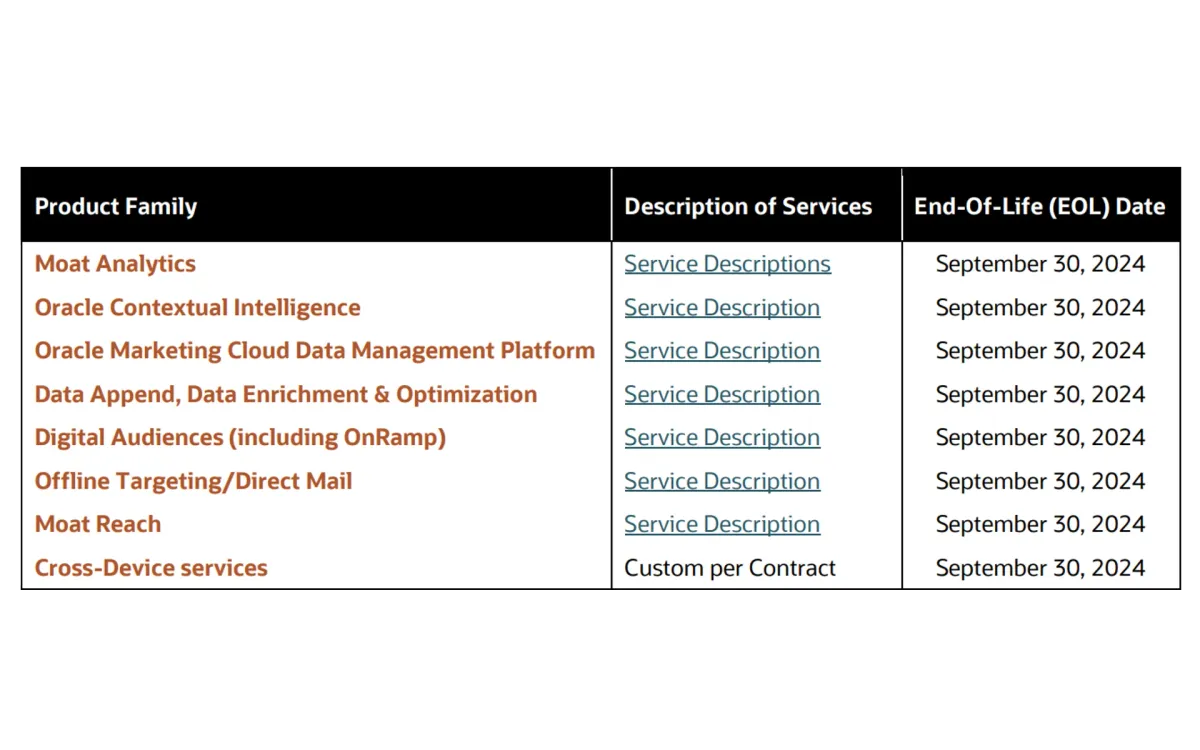
Oracle Corporation this week announced the end-of-life (EOL) of its Advertising products and services. This decision affects a variety of advertising-related offerings, including data management, audience and contextual targeting, and analytics. The EOL will take effect on September 30, 2024.
The following Oracle Advertising products and services will be discontinued by September 30, 2024:
- Moat Analytics Service
- Oracle Contextual Intelligence Service
- Oracle Marketing Cloud Data Management Platform Service
- Data Append, Data Enrichment & Optimization Service
- Digital Audiences (including OnRamp) Service
- Offline Targeting/Direct Mail Service
- Moat Reach Service
- Cross-Device services (custom per contract)
Impact on Existing Customers
- New Agreements: Oracle will no longer enter into new agreements for any Advertising products or services.
- Existing Orders: Oracle will continue to fulfill existing orders for Advertising products and services until the September 30, 2024 EOL date.
- Data Providers: Oracle will terminate relationships with data providers used for its Advertising products.
- Contract Renewals: Renewals for Advertising services will not be offered. Existing services will terminate at the end of the contract term.
- Early Termination: Customers can terminate their Advertising contracts before the EOL date by contacting Oracle at [email protected].
Data and Service Access
- EOL Date: Access to all Oracle Advertising services will be terminated on September 30, 2024.
- Data Removal: Customers can begin removing Oracle data from their systems at any time. Oracle should be informed of data removal at [email protected] to finalize the contractual termination process.
- Data Deletion: Oracle will retain data in accordance with contract terms, including for legal purposes and fulfilling remaining obligations. Data will be deleted once these obligations are met. Customers are not required to request data deletion.
- Data Usage Rights: Ongoing usage rights for data received by customers are defined within their product or service description.
Data Privacy and Security
Oracle assures customers that data security and privacy standards will be upheld throughout the wind-down period and beyond.
Post-EOL Considerations
- Reporting: Customers may be required to continue fulfilling reporting obligations, such as data usage reporting, as outlined in their contracts.
- Data Provider Payments: Oracle will continue to calculate and pay data providers according to existing contracts.
The reasons behind Oracle's decision to exit the Advertising business are not explicitly stated in the EOL FAQ (first published by AdWeek):
However, companies may exit a market for various reasons, such as a shift in business focus, consolidation within the industry, or a determination that the advertising sector is no longer strategically aligned with the company's goals. In case of Oracle, the exit of the advertising business happens after years of decline.
The EOL of Oracle Advertising products and services may prompt users to explore alternative solutions from other providers in the advertising technology (adtech) space, and antitrust concerns resurface as Oracle shuts down ad tech business.
Moat Analytics Service
Oracle Contextual Intelligence Service
Oracle Marketing Cloud Data Management Platform Service
Data Append, Data Enrichment & Optimization Service
Digital Audiences (including OnRamp) Service
Offline Targeting/Direct Mail Service
Moat Reach Service
Oracle's decision to shut down its advertising products and services will probably lead to a shift in the ad tech market landscape, with consolidation and reduced competition as the key themes:
Reduced Competition: In the short term, there might be a temporary flurry of activity as established players position themselves to capture customers leaving Oracle. However, the long-term trend is likely to be less competition. With Oracle exiting the market, the remaining players have a significant opportunity to expand their market share. This could lead to a situation where a few dominant players control a large portion of the market, potentially stifling innovation and reducing overall choice for advertisers.
Consolidation Benefits Established Players: Established ad tech companies like Google, IAS, DoubleVerify, Peer39, and Liveramp are well-positioned to benefit from Oracle's exit. They can leverage their existing solutions, expertise, and customer base to attract migrating customers. This consolidation strengthens their market positions and potentially increases their bargaining power with advertisers.
Impact on Google: Google, with its comprehensive suite of ad tech offerings, stands to gain significant advantages:
Market Share Boost: Oracle's departure creates an opportunity for Google to absorb a larger share of the market, particularly for data management, audience targeting, and analytics solutions. This translates to increased revenue and market dominance for Google.
Reduced Pressure to Innovate: Oracle's Contextual Intelligence Service was a competitor to Google's contextual targeting solutions. Without this competitor, Google may face less pressure to innovate and improve its contextual targeting offerings. This could potentially lead to a less dynamic and competitive environment in this specific area.
Long-Term Market Dynamics: The long-term impact of reduced competition is yet to be seen. Regulatory scrutiny of dominant players like Google could act as a countervailing force, promoting fairer competition. New players may emerge to fill the void left by Oracle, potentially mitigating the negative effects of consolidation.
Overall, Oracle's advertising shutdown presents a scenario where established players like Google are likely to benefit from reduced competition. This could lead to less innovation and potentially higher prices for advertisers in the long run. The regulatory environment and potential emergence of new players will be crucial factors shaping the market's future.

